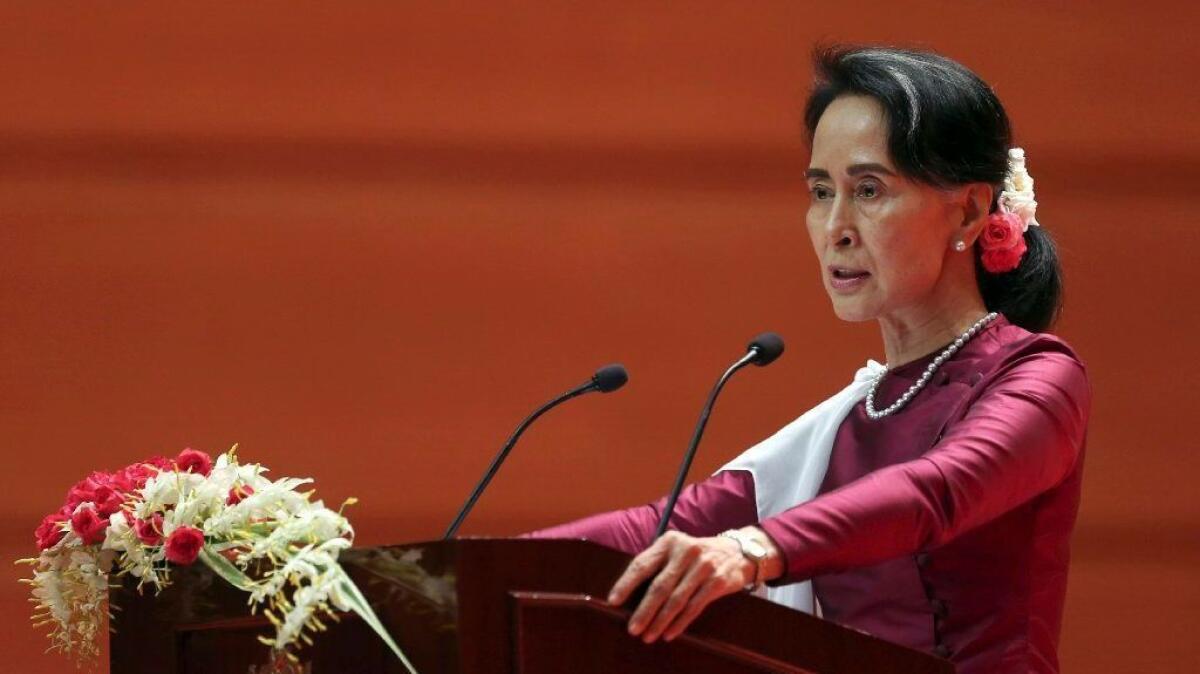Editorial: Time for Aung San Suu Kyi to start acting like the Nobel winner she is

- Share via
While much of the world has been fixated on the electoral drama in the U.S., another fraught election took place this past weekend in a country racked by violence and human rights abuses.
For only the second time since it transitioned from a military dictatorship into a fledgling democracy in 2015, voters in the South Asian country of Myanmar went to the polls to elect members of its parliament. The ruling National League of Democracy, the party of Nobel Peace Prize winner Aung San Sui Kyi, has reportedly won in a bigger landslide than it did five years ago. Just as in the U.S., masses of voters turned out, enduring long lines despite a surge of coronavirus cases.
That may sound like a thriving democracy, but Myanmar, also known as Burma, has been anything but.
Suu Kyi, the democracy advocate who spent 15 years under house arrest when Myanmar was ruled by a military junta, has been in some ways as authoritarian as her predecessors.
She has overseen a government that has jailed student activists, protesters and journalists (including two working for Reuters investigating the execution of 10 Rohingya men and boys). The country’s election commission restricted campaigning by opposition parties and canceled voting, supposedly out of security concerns, in dozens of townships where ethnic minority populations — who have been critical of Suu Kyi’s party — have clashed with military forces. More than 1.6 million were disenfranchised.
But nothing has tarnished Suu Kyi’s international reputation and disillusioned her admirers more than her refusal to protect Myanmar’s Rohingya Muslims, one of the most oppressed populations in the world. Despite centuries in Myanmar, the Rohingya have been largely denied citizenship by the country’s Buddhist majority, which sees them only as outsiders. An estimated 600,000 Rohingya live in the country, with about 130,000 in wretched displace-persons camps in Rakhine state. Their movements, education and job opportunities are all restricted in what the United Nations and human rights groups have described as a state of apartheid.
In 2016 and 2017, after attacks on military outposts by Rohingya militants, government forces and their supporters initiated campaigns of violence against the Rohingya that went far beyond retaliation. In 2017, unknown numbers — perhaps thousands — were killed, raped, burned to death and forced from their villages, causing about 700,000 to flee into neighboring Bangladesh and its squalid refugee camps.
As a result, the Myanmar government faces accusations of genocide brought by Gambia in the United Nations’ International Court of Justice. And despite Suu Kyi’s testimony that the violence stemmed from attacks by a rebel group, the court unanimously voted in January to order her government to protect the Rohingya and preserve any evidence of genocide while it continues its inquiry.
So that’s where this country and its elected leaders stand days after the election — with a court order over their heads not to commit genocide.
The Myanmar constitution reserves a quarter of the seats in parliament and several top ministry positions for the military, so some observers speculated that Suu Kyi didn’t feel free to advocate for the Rohingya right after Myanmar’s shift to democracy. Sadly, many human rights activists who once revered her now believe she is a Myanmar Buddhist who simply doesn’t recognize the rights of the Rohingya to be full citizens.
If she wants to be a true leader, this is the time to show that she can be the democracy icon that the Nobel committee believed she was when it awarded her the peace prize in 1991.
She should lead the way toward a long overdue acceptance of the Rohingya. She should push for reforming citizenship laws and dropping restrictions on the Rohingya. The government has begun to dismantle the horrible camps in which displaced Rohingya live, but only to move the residents into permanent structures in the current camp locations. That’s just a continuation of their segregation. The Rohingya want to return to their villages. They should be allowed to do so.
Suu Kyi’s party has kept its hold on power in Myanmar. The U.S. government should now do everything it can to both encourage and help the country transform itself into the human-rights-respecting democracy all of its people deserve.
More to Read
A cure for the common opinion
Get thought-provoking perspectives with our weekly newsletter.
You may occasionally receive promotional content from the Los Angeles Times.










